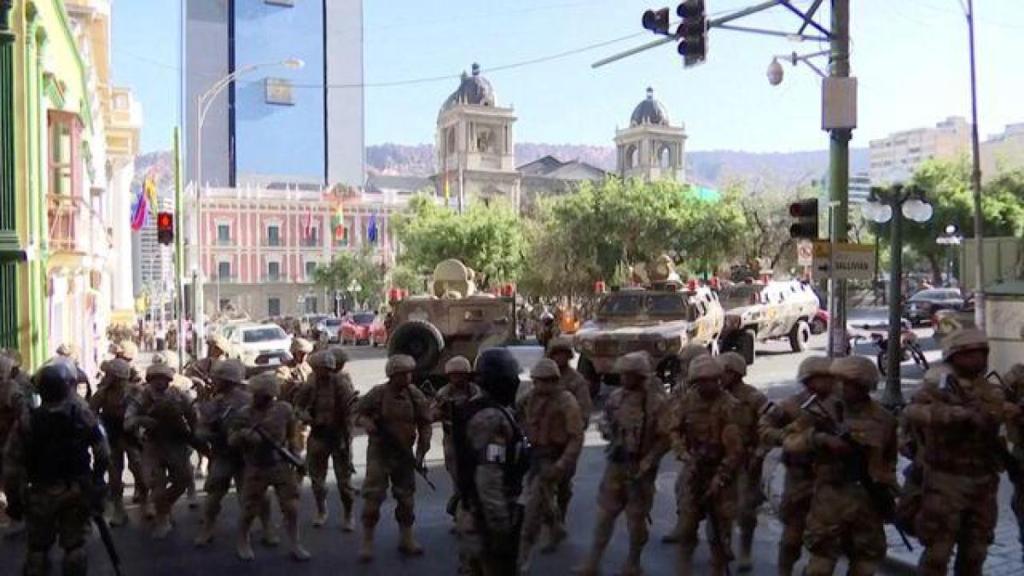Three weeks ago, Bolivia’s President, Luis Alberto Arce Catacora, attended the International Economic Forum in St. Petersburg, Russia, to discuss several projects, including the establishment of a Nuclear Research and Technology Centre. Upon his return, Bolivia plunged into political turmoil with a coup attempt threatening the stability of the South American nation.
What to keep in mind
This is the second coup attempt in the Bolivian state in under 5 years.
This country is part of the Lithium Triangle (Argentina, Chile & Bolivia) and has almost 21 million tons of lithium reserves, which as reported previously is considered to be the largest in the world.
This country is also among the few countries across the globe to have cut off all relations with Israel in condemnation of the genocide in Gaza.
Prelude to the Coup
President Luis Arce’s visit to Russia and his discussions with President Vladimir Putin aimed to bolster Bolivia’s economic and technological ties, including a potential entry into the BRICS forum. However, tensions escalated upon his return. On a fateful Wednesday, a failed coup attempt in Bolivia by General Juan José Zúñiga, soldiers stormed the Palacio Quemado, Bolivia’s government headquarters in La Paz, in a violent bid to overthrow the government. President Arce called for national mobilization against the coup, emphasizing the need to protect democracy.
Bolivia & BRICS & Russia
Bolivia Foreign Minister Celinda Sosa Lunda during the visit to Moscow in April this year said: “We hope to become a part of BRICS. We would like to… become a part of this economic and friendly space, to oppose the hegemony of the United States”
Russia Foreign Minister Foreign Minister Sergey Lavrov said: “Russia supports these Bolivian aspirations.”
During that meeting the two countries agreed to diversify bilateral trade and in implementing promising investment projects. And adopted a decision to use more actively the potential of the Russian-Bolivian Intergovernmental Commission on Trade and Economic Cooperation.
In the energy sector, Gazprom and Bolivia’s YPFB Oil and Gas Company are developing the Ipati and Aquio oil and gas areas. Rosatom is building the Centre for Nuclear Technology Research and Development in El Alto, a unique pilot project for both Bolivia and the rest of Latin America. And exploration and industrial development of Bolivia’s lithium deposits that would help to strengthen bilateral relations.
The Coup Attempt Unfolds
The coup attempt was spearheaded by US backed General Juan José Zúñiga, until his dismissal a day prior. Zúñiga opposed a new government under former President Evo Morales. The conflict intensified as soldiers clashed with police and broke into President Arce’s residence. Arce responded by appointing a new military leader, General José Wilson Sánchez, who commanded the troops to return to their barracks. This decisive action led to the withdrawal of the soldiers and the arrest of Zúñiga and former Navy commander Juan Arnez Salvador.
National and International Reactions
The coup attempt was widely condemned both domestically and internationally. President Arce, alongside Vice President David Choquehuanca and his ministers, addressed the nation to promote unity and calm. Arce’s swift actions included the appointment of a new military command to ensure the stability of the legally constituted government.
The Bolivian Workers’ Central (COB), the country’s largest labour union, declared an indefinite general strike, urging all unions to defend the government in La Paz. This call for solidarity extended across the political spectrum, with opposition leaders such as Luis Fernando Camacho and former President Carlos Mesa voicing their support for democratic institutions.
Underlying Tensions and the Role of Former Allies
The coup attempt cannot be viewed in isolation from the broader political context in Bolivia. Once allies, President Arce and former President Evo Morales are now at odds. Arce accused Morales of orchestrating a “soft coup” to undermine his government. The country’s economic woes, including dollar and fuel shortages, have further exacerbated social tensions. Legislative paralysis and judicial interventions have left the political landscape fraught with conflict.
Iran’s Influence in Latin America
Adding to the complexity, Bolivia’s recent defense cooperation with Iran has raised regional concerns. The agreement, signed by Bolivian Defense Minister Edmundo Novillo and Iranian Brigadier General Mohammad Reza Ashtiani, includes the deployment of Iranian-made drones in Bolivia, ostensibly to combat drug trafficking and secure borders. However, security experts warn that this move could destabilize the region, given Iran’s strategic positioning in Latin America.
Iran’s alliance with Bolivia, reinforced by ties with Venezuela and Cuba, reflects a broader strategy to exert influence over Latin American governments. This alliance poses a potential threat to democratic norms and regional stability.
Conclusion
The recent coup attempt in Bolivia underscores the fragility of the country’s political landscape and the broader geopolitical dynamics at play. President Luis Arce’s swift response and the support from various sectors of society have, for now, thwarted the coup. However, the underlying economic and political tensions remain unresolved.
As Bolivia navigates this crisis, the international community watches closely. The involvement of external actors like Iran further complicates the situation, raising questions about the future of democracy and stability in the region. The resilience of Bolivia’s democratic institutions and the unity of its people will be crucial in overcoming these challenges and ensuring a peaceful and stable future for the nation.

